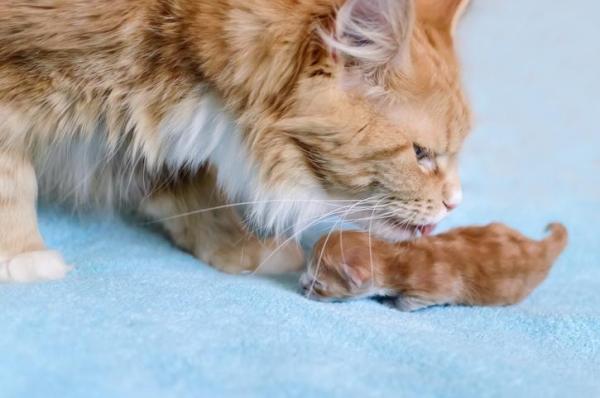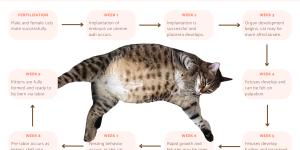Why do Cats Move Their Kittens?



See files for Cats
After a cat gives birth, it is important to be mindful of a mother cat's behavior toward her kittens. Even with first-time mothers, her instincts will kick in and look after all of the kitten's needs. From the second they are born, the mother cat helps them to feed, defecate, stay warm and even move around. Before the birth, the mother will search out a place to nest so she can give birth somewhere safe. This is why it can be strange to see the cat move her kittens to another place.
At AnimalWised we answer the question, “Why do cats move their kittens?” We explain the possible reasons behind this behavior and explain more about a mother cat's instincts when it comes to her kittens. Additionally, we also discuss possible reasons a cat takes her kittens to her human guardian.
Why do cats move their kittens around?
To understand why a cat moves her kittens around, we need to consider her instincts. Although they have been domesticated for millennia, cats still retain some instinctive habits akin to their wild relatives. While enjoying the comfort, care and security living with humans provides, a domestic cat still needs to rely on innate instinct to take care of their young. For example, when a kitten is born, the mother knows to break open its amniotic sac with their teeth, otherwise the kitten would suffocate.
In nature, when a wild cat senses the delivery is soon approaching, they will look for a hiding place or shelter. This is a place which is calm and provides security from potential dangers. The specific criteria of what makes a good nest or den is not always easy to discern. You may provide a comfortable place for the cat to give birth, but they may still end up choosing somewhere else.
However, even postpartum, the cat will be sensitive to their environment. They will be alert to any threat which might threaten their newborn offspring. This comes to the main reason why cats move their kittens: they perceive a threat.
When a kitten is born, both their ears and eyes are closed and they cannot walk. They can neither defend themselves, nor evade an attack. They are especially vulnerable to opportunistic predators and rely on their mother for protection. The mother cat will move her newborn kittens to ensure they are hidden to best preserve their safety. This is part of the mother cat's maternal instinct. This instinct is indispensable to the survival of the cat species. The cat will do everything they can to help their kittens survive until they can be on their own, including moving them to a new location.
For domestic cats, this can seem strange. You may have provided everything they need, but yet they still want to move their kittens. However, just because we can't see a threat, doesn't mean the mother cat does not. Whether or not there is an actual danger, the mother cat may move her kittens to somewhere they deem more secure.
However danger or threat are not the only reasons a cat might move her kittens. Here are some other potential reasons:
- They don't like the material of where they are.
- If they are are up too high, they may want to move somewhere lower.
- Mother cats generally prefer flat surfaces. Even if you have provided a comfortable bed, this may not be their preference.
- Many guardians want to interact with the kittens as they are so adorable. However, this might be causing the mother to stress and she moves the kittens to get away from it.
- The place they are in may have become colder or less comfortable.
Even though we might think we have provided a comfortable space for our cat to nest, it is up to her to choose her den. Try to provide a safe, clean, comfortable and warm space, but never force them to stay there.

Why does my cat bring her young to me?
Another common situation after a cat gives birth is to observe them moving her kittens towards you. This is because you are their family. As a cat guardian you will have provided everything they need for years. If a cat fears their kittens are in some danger or discomfort, they may bring them to you to feel secure.
If your cat does bring their kittens to you for the above reason, then you should try to find somewhere better for them. Assess where they were previously and try to work out the problem. Even if you can't see any obvious issue, try to make a new place which feels comfortable. Remember they often don't like areas which are too high or too soft. A cat which does not have a sufficient space to mother may reject their newborn kittens and stop feeding them. Another solution may be to move their den somewhere closer to you so you can keep a better eye on them (without interfering needlessly).
Similarly, a dependency issue may make a mother cat take her young to you. Although cats are excellent mothers, they are also independent animals. This partly allows them to properly care for their young without our intervention. However, a cat which has become overdependent on us may lack some ability in caring for their kittens. It is usually unintentional, but the result is that the cat seeks help to care for her kittens. This is why they may be bringing them to you.
Why do cats eat their young?
Although a cat eating her young is a strange often repulsive act, it is also a natural behavior of felines. It occurs in many other species in nature and it is incorrect for us to apply human behavior patterns and morals to animals. Although there is no single reason why a cat may eat her young, the main reason is because they believe the kitten is too weak to survive. By eating a weaker kitten, the mother can better provide for the rest of the litter.
How a cat knows to eat their young depends on the reason. A cat may be stillborn, have some sort of deficiency or be deformed in some way. This means they will be unlikely to survive in the wild. Also, a dead kitten will attract predators in the wild as well as create hygiene problems in any situation.
It is possible a cat will eat her kitten which looks otherwise completely healthy. If this is the case, it could be due to:
- Stress
- Feline Mastitis
- Lack of interest in caring for kittens
- Don't recognize puppies as their own
If a cat is under our care, then it is important we only intervene when necessary. If the cat has eaten their kitten because they are stillborn or for a similar reason, there's nothing we should do. We need to leave them alone to raise their young. However, if the mother cat is stressed or rejecting their kittens unnecessarily, then we can step in. In these cases we will need to take over their role and learn how to care for the kittens. This includes knowing how to feed a newborn kitten.
At what age do cats leave their young?
There is no exact moment when a mother cat will leave her young. Firstly, it is important to know when a cat moves her kittens, they are not necessarily abandoning them. When a cat decides to abandon her kittens, she will just leave them and will stop caring for them.
A cat will have a genuine reason to leave her kittens when she has finished providing proper care. This means when the cat has weaned them onto solid food. This is a gradual process which will differ on the individual circumstances. In general, however, a kitten should stay with their mother for a minimum of 8 weeks, but best to have at least 12.
After this time, the mother cat will start to ignore her kittens. She will stop them from feeding from her nipples and may even seem to aggressively shun them by hissing at them. This is normal behavior and is designed to stop the young cats being dependent. Before this happens, she will have taught them how to care for themselves by hunting and interacting with their environment.

The importance of sterilization
Now you know why cats move their young and have learned more about what it takes to care for kittens, you know there is a lot to consider. Even if the cats are born healthy and their weaning processes goes smoothly, the kittens will have to be provided a safe environment.
Unfortunately, there are already many cats which are struggling to find a secure home. Animal shelters have too much strain on them as it is and struggle to find homes even for healthy cats. This is why sterilization is so important. We have an overpopulation of domestic cats which leads to having many abandoned or turned feral. We also don't have enough people willing to take in and care for cats.
Sterilization not only helps to reduce feline overpopulation, but it has benefits for the cat. For more information, take a look at our article everything you need to know about neutering a cat.

If you want to read similar articles to Why do Cats Move Their Kittens?, we recommend you visit our Gestation category.







